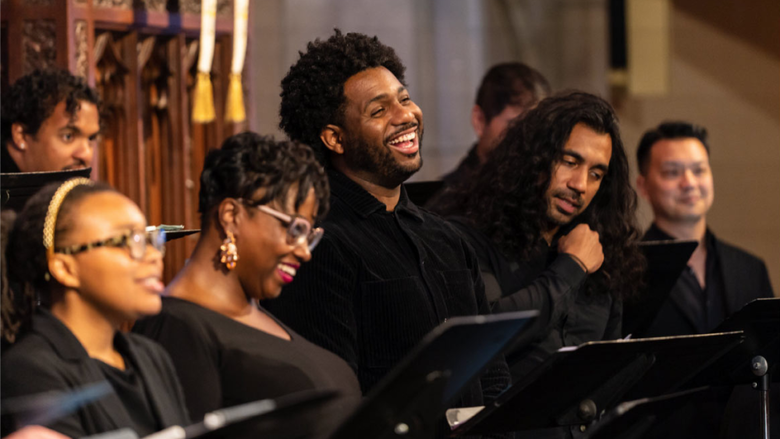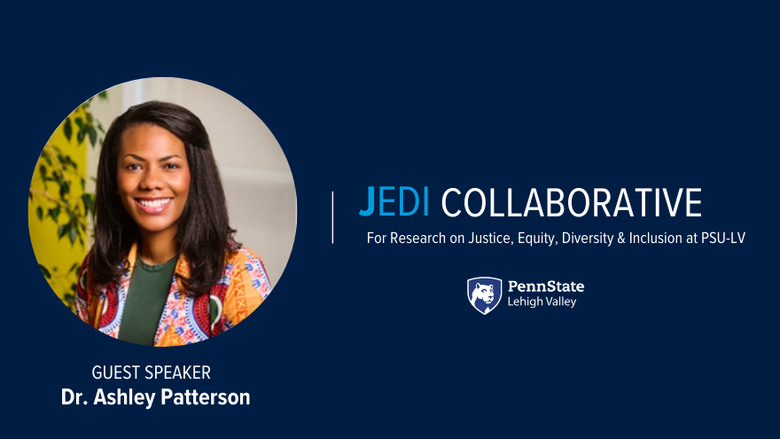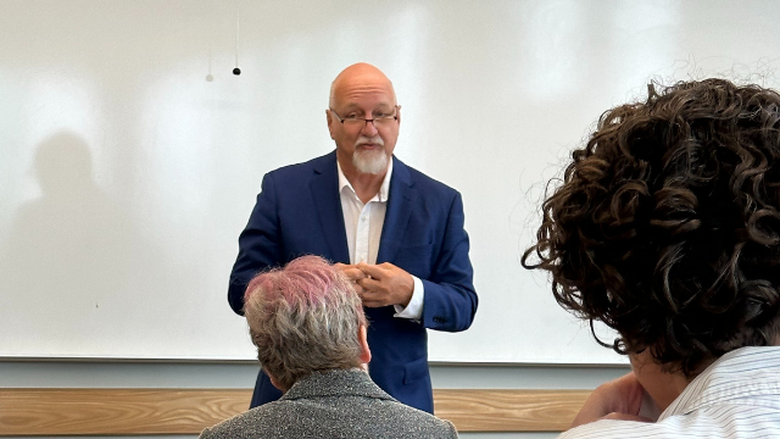
On Nov. 7, 2022, JEDI held the first of two community speaker events that align with their mission. Judith Sabino, chief diversity/cultural liaison at the Lehigh Valley Health Network, spoke about “Cross Cultural Care.”
CENTER VALLEY, Pa. — Penn State Lehigh Valley students who are passionate about making the world a more equal, just and inclusive place can find support with a new initiative. The Penn State Lehigh Valley Collaborative for Research on Justice, Equity, Diversity, and Inclusion (JEDI) supports outstanding students who are conducting research relevant to these areas. An accompanying speaker series will showcase the students’ work.
JEDI was launched in the fall 2022 semester. Planning began last year with a core group of four members: Jennifer Parker, associate professor of sociology; Maung Min, associate teaching professor of business and director of business programs; Denise Ogden, professor of marketing, and Laura Cruz of the Schreyer Institute for Teaching Excellence.
The project has a 15-member board comprised of students, faculty, staff, alumni and community/industry representatives. On Nov. 7, JEDI held the first of two community speaker events that align with its mission. Judith Sabino, chief diversity/cultural liaison at the Lehigh Valley Health Network (LVHN), spoke about “Cross Cultural Care.”
“[Sabino] has been with LVHN for many years and has done a phenomenal job. She spearheaded different initiatives that have made a significant difference,” Parker said. “LVHN has been recognized for their values around human rights and the LGBTQ+ community. She told stories about cases involving cultural care, is a leader for issues around equity and inclusion in health care in the Lehigh Valley, and has developed their toolkit for diversity.”
In her presentation, Sabino said “culture” is more than race and ethnicity: “It is integrated patterns, learned core values, and customs that exist within a group of people. All of us are multicultural because we exist within multiple groups. Culture is very broad and changes over time.”
Similarly, cultural competence in health care is the ability of systems to provide care to patients with different cultures. This is important, Sabino said, because “it improves the quality of care we provide, [it] improves outcomes, and improves patient satisfaction. Cross-culture care leads to high quality, which is equitable care.”
Sabino said cross-culture care involves negotiation and shared an example of a patient, a member of the plain Amish community, who had come to the hospital with severe burns. “The patient wanted to use burdock leaf ointment, which is a traditional remedy within the plain Amish community,” she said. “The attending doctor said, ‘We will try it, but if there is no improvement, we will treat using our methods.’ The Amish patient felt heard, the ointment worked, and the doctor included it as a possible treatment for severe burns.”
Sabino discussed the importance of health care workers understanding the language and concerns of different cultures so they may be given treatment appropriately and respectfully. “[Care] can be culturally sensitive. We ask each person about their cultural preferences when it comes to their care. Culture is not monolithic, but specific to each person. Cross cultural care is welcoming and accommodating,” she said.
Two Penn State Lehigh Valley students were awarded research fellowships for their work in this space:
- Fernando Biden Gato, a psychology major received a research fellowship for his proposal, “Microaggressions from Multiple Directions: Experiences of Nurse Assistants and Other Direct Care Healthcare Workers.” His research mentor is David Livert, professor, psychology.
- Gianna Gomes, a rehabilitation and human services major, was awarded a fellowship for her research on the subject of abuse among children with disabilities. Her mentors are Teri Kistler, program coordinator and lecturer, rehabilitation and human services; Andjela Kaur, assistant teaching professor, rehabilitation and human services; and Parker.
Parker hopes the JEDI initiative will encourage students to pursue their research interests.
“Any student is open to apply [for research fellowship awards],” Parker said. “The idea of JEDI is students can apply to conduct research in any area of their passion; it just has to have some kind of JEDI component. We push the idea that research is important — the retention rate of students who participate in research are three times more likely to complete school than students who do not participate in research.”
She also said the fellowship has many benefits.
“The students will not only get financial support, but mentorship, which could steer them toward professional opportunities — presenting at a conference or publishing a paper,” said Parker. “It could put them on a path toward doing this work — graduate school or professionally. I think it also puts us on the Penn State map for supporting student research in areas of social importance and significance.
“We don’t want students to just do research,” Parker added. “We want them to ask themselves, ‘What is this doing? What is it doing for our community and our world? How is it making it better?’ This is in keeping with Penn State’s motto — ‘Make life better.’”
Applications for the next round of research fellowship awards will be available in February 2023.





